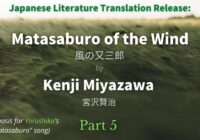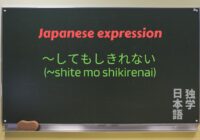Author Archives: locksleyu
Japanese Literature: Using Western letters as placeholders for names
Compared to English, Japanese has countless differences in how things are expressed, including major things like word order, particles, and levels of politeness. However, if you ponder things long enough, and do enough research, you can often find something similar in English, or at least a roughly equivalent way to express things, whether that is… Read More »
Japanese literary expression: 〜さに (~sa ni)
In this post I’d like to go over a Japanese expression that you don’t hear too often in conversation, but is somewhat common in literature, especially works that are a few decades old. The pattern is [adjective] + さに (sa ni). You can use i-adjectives or na-adjectives, but if you use the latter you need… Read More »
Site review: Linguee (an online bilingual dictionary)
Doing a lot of translations these days, I come across a bunch of sites related to word meanings. One site of particular note that I would like to give a brief review of is Linguee (http://www.linguee.com). This site supports meaning lookup for twenty-some languages, although I have only used it for Japanese to English. For… Read More »
Nanobe Days: a novel about the power of technology (and a zombie-less zombie apocalypse)
An interesting Japanese expression about hunger
Learning useful day-to-day expressions is often one of the first priorities of a student of a foreign language, and being able to express being hungry (something which should happen to everyone daily) is pretty high on that list. The typical way we learn to express hunger is お腹が空く (onaka ga suku), which literally means “the… Read More »
Aikido: Response to a question about “Uke” vs “Nage” terminology
Japanese literature translation: 風の又三郎 (Matasaburo of the Wind) by 宮沢賢治 (Kenji Miyazawa) [Part 5]
Japanese expression: 〜してもしきれない (~shite mo shikirenai)
In this post I want to go over a Japanese expression that builds on a few fundamental grammar aspects to make an interesting result. The expression can be described in generic form as 〜してもしきれない (~shite mo shikirenai), but you can switch the “suru” verbs with any other verb. First, let’s look an example: この染み、拭いても拭ききれない (kono… Read More »









